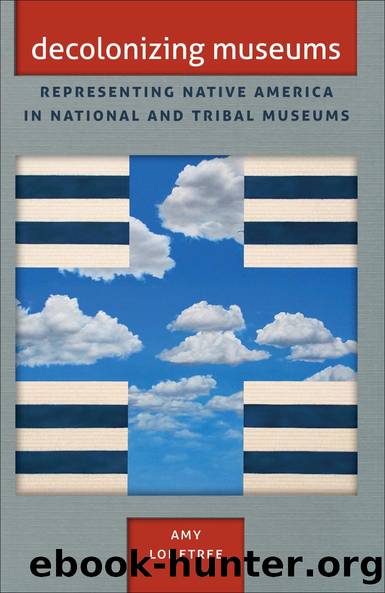Decolonizing Museums by Amy Lonetree

Author:Amy Lonetree [Lonetree, Amy]
Language: eng
Format: epub
ISBN: 9780807837153
Barnesnoble:
Publisher: The University of North Carolina Press
Published: 2012-11-19T00:00:00+00:00
CONCLUDING IMPRESSIONS OF EXHIBITION PLANS: 2001â2002
My research visit in December 2001 gave me the opportunity to meet with several curators and other NMAI staff. At the conclusion of this trip, I spent a day touring the United States Holocaust Memorial Museumâmy third visit to this powerful site. After another thought-provoking and moving experience, I wrote the following thoughts on the NMAIâs plans for the inaugural exhibitions on the National Mall. I quote at length from my field notes and the brief essay I drafted shortly thereafter on my impressions:
In their philosophy and scope, the museumâs exhibitions hold the promise of offering new interpretations of Native life. Allowing tribal communities to have curatorial authority makes a presentation of Native American history and culture possible on a scale never seen before. To allow Native communities to speak for themselves on their philosophies, histories, and identities will advance the historical record. It will also challenge commonly held stereotypes of Indian people predominant in American culture.
The curatorial staff involved in the project have asserted that the Native voice is fundamental to the development of the exhibitions and that the three inaugural exhibits will reflect Native participation. This important site of tribal history and memory will provide an opportunity to correct historical wrongs through the telling of Native histories in a national museum. The Holocaust Museumâanother national museum located in D.C.âis a powerful testimony of Holocaust history and memory and conveys a story that clearly challenges visitors as it forces them to confront inhumanity on a scale so large that it is, at times, difficult to comprehend.
The Native American story is tragic as well. My concern is that our stories will come across as more benign than those at the Holocaust Museum. Will the new museum challenge people to reflect on the atrocities committed against Native people and on those responsible for such actions? The new museum needs to challenge the very core of American consciousness. American identity is defined by what took place on the frontier and the supposed disappearance of the Indian is central not only to the idea of America but also to what it means to be an American.
People need to know that they did not invade virgin lands. America was not a cultural backwater. Indigenous people were here; they achieved great civilizations. Their world began hereâin North America. We were not only here then, but we are still here now. If we celebrate only survival and benign historiesâif we present stories in ways that fail to carry out the full force of their educational responsibilitiesâdo we do a grave disservice to tribal peoples?
In his work Preserving Memory: The Struggle to Create Americaâs Holocaust Museum, Linenthal traced the ongoing controversies over specific story lines presented at the Holocaust Museum. Whose stories would be told, and who would tell them? By contrast, the NMAI staff agrees for the most part to privilege Native voices and to allow communities to drive the content. In my experiences at the NMAI, the idea of turning curatorial control over to Native peoples has not been heavily criticized by staff members.
Download
This site does not store any files on its server. We only index and link to content provided by other sites. Please contact the content providers to delete copyright contents if any and email us, we'll remove relevant links or contents immediately.
Cecilia; Or, Memoirs of an Heiress — Volume 1 by Fanny Burney(31351)
Cecilia; Or, Memoirs of an Heiress — Volume 3 by Fanny Burney(30948)
Cecilia; Or, Memoirs of an Heiress — Volume 2 by Fanny Burney(30907)
The Great Music City by Andrea Baker(21571)
We're Going to Need More Wine by Gabrielle Union(18083)
Bombshells: Glamour Girls of a Lifetime by Sullivan Steve(13119)
Pimp by Iceberg Slim(12946)
All the Missing Girls by Megan Miranda(12774)
Fifty Shades Freed by E L James(12462)
Talking to Strangers by Malcolm Gladwell(11905)
Norse Mythology by Gaiman Neil(11901)
Crazy Rich Asians by Kevin Kwan(8369)
Mindhunter: Inside the FBI's Elite Serial Crime Unit by John E. Douglas & Mark Olshaker(7848)
The Lost Art of Listening by Michael P. Nichols(6481)
Enlightenment Now: The Case for Reason, Science, Humanism, and Progress by Steven Pinker(6414)
Bad Blood by John Carreyrou(5780)
The Four Agreements by Don Miguel Ruiz(5530)
Weapons of Math Destruction by Cathy O'Neil(5046)
We Need to Talk by Celeste Headlee(4879)
